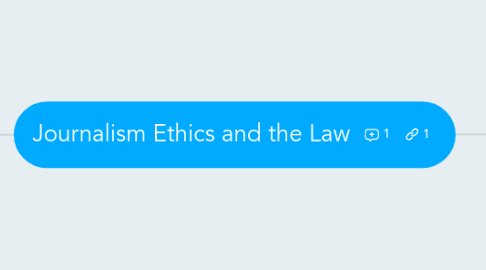
1. Rights
1.1. Freedom of the Press
1.1.1. Milton Areopagitica
1.1.2. Christopher Hitchens defends Noam Chomsky. Chorus and Cassandra
1.1.3. Canadian Constitution Act
1.1.3.1. Charter of Rights and Freedoms
1.1.3.1.1. G20 Watershed moment
1.2. Access to Information
1.2.1. Freedom of Information and Protection of Privacy (FIPPA)
1.2.1.1. In Canada
1.2.1.1.1. Access to Information and Privacy Act
1.2.1.2. In Manitoba
1.2.1.2.1. Subject to this Act, an applicant has a right of access to any record in the custody or under the control of a public body, including a record containing personal information about the applicant.
1.2.1.2.2. Manitoba Ombusman
1.2.1.3. City of Brandon
1.2.1.4. Brandon University
1.2.2. Not doing so good
1.2.2.1. Democracy Watch
1.2.2.1.1. Open Government Campaign
1.2.2.2. Censorship
1.2.2.3. Privacy and Access Council of Canada
1.3. Privacy
1.3.1. Third party applications in social media
1.3.1.1. Tracking apps
1.3.1.1.1. Wireshark
1.3.1.1.2. Fiddler
1.3.1.2. VPN
1.3.1.2.1. Hotspot Shield
1.3.1.2.2. PureVPN
1.3.2. Deep web for journalists
1.3.3. UN Report on Encryption
1.3.4. Internet privacy in Canada
1.3.4.1. Michael Geist
1.3.5. Photojournalist rights
1.3.5.1. When can you take a picture?
1.3.5.2. When are you prohibited?
1.3.5.2.1. There are reasonable limits on photography, and Section 162 of the Canadian Criminal Code does prohibit secretly watching, photographing or making a video recording of anyone – including celebrities – at a time or in a place where the person is entitled to expect privacy
1.3.6. Audio recording
1.3.6.1. One party consent
1.3.6.1.1. You can record a conversation in which you are a participant.
1.3.6.1.2. No wiretapping or electronic eavesdropping
2. Responsibilities
2.1. Legal and Ethical Issues
2.1.1. Ethics
2.1.1.1. Moral codes
2.1.1.1.1. Moral Foundations Theory
2.1.1.2. When not to publish
2.1.1.2.1. Publication bans
2.1.1.2.2. BUREC Policies and Procedures
2.1.1.2.3. Self-imposed bans
2.1.1.2.4. Self Censorship
2.1.1.3. Codes of practice
2.1.1.3.1. CBC Journalistic Standards and Practices
2.1.1.3.2. International Principles of Professional Ethics in Journalism UNESCO
2.1.1.3.3. Investigative Reporters and Editors
2.1.1.3.4. Society of Professional Journalists
2.1.1.3.5. Canadian Association of Electronic Journalists RTDNA Code of Ethics
2.1.1.3.6. Canadian Association of Journalists
2.1.1.3.7. Collection of European Codes
2.1.1.4. Services
2.1.1.4.1. Center for Digital Journalism Ethics
2.1.1.4.2. iMediaEthics
2.1.2. Copyright
2.1.2.1. Law
2.1.2.2. Creative Commons
2.1.2.3. Watermarking
2.1.2.4. Disable CopyPaste
2.1.2.5. Copyright debate--Picking the Locks, Cory Doctorow
2.1.3. Fact Checking
2.1.3.1. Critical Thinking
2.1.3.1.1. Fact Checking
2.1.3.1.2. Webproofing
2.1.3.1.3. How to spot logical fallacies
2.1.3.1.4. Bias
2.1.3.1.5. Resources
2.1.3.2. If your mother says she loves you, check it out.
2.1.3.3. Fraud in journalism
2.1.4. Protection of sources
2.1.4.1. Encryption
2.1.4.1.1. Encrypt your Dropbox account
2.1.4.1.2. Friends of Wikileaks
2.1.4.1.3. TrueCrypt vs Encrypted Zip files
2.1.4.1.4. Cryptocat
2.1.4.1.5. SafeGmail
2.1.4.1.6. Steganography and Watermarking
2.1.4.1.7. Security in a Box
2.1.4.1.8. Alternative Web Applications
2.1.4.1.9. Zerobin
2.1.4.1.10. GPgG4Win
2.1.4.2. Some guidelines from Wired Magazine.
2.1.4.2.1. Reporting by computer
2.1.4.2.2. Reporting by phone
2.1.4.3. Infosec from the Center for Investigative Journalism
2.1.4.4. Public Servants Disclosure Protection Act
2.1.4.4.1. Auditor General report on Christiane Ouiment, integrity commissioner
2.1.4.5. Cautionary notice to sources
2.1.4.5.1. If a journalist were completely honest with a source about what it means to be interviewed for this sort of story, it would go something like this: you are going to tell me about the worst day of your life, because you think there is value in sharing that story with the rest of the world. You need to trust me, but you need to know I am not your friend. I will seem as sympathetic as I can be, but I will also note the exact moment you start crying so I can write about it. I will ask questions that might make you uncomfortable. I will call other people and tell them what you're saying about them. I will open you up to the judgment of the entire world. And then I will walk away. And if you aren't ready to deal with that, you shouldn't talk to me.
2.1.4.6. Canadian law S231
2.1.4.6.1. Defines journalist
2.1.5. Protection of Journalists
2.1.5.1. Unprecedented scrutiny of journalists
2.1.5.2. Canadian Journalists for Free Expression
2.1.5.3. Self-protection
2.1.5.3.1. Ononymous collective
2.1.5.4. Council of Europe, Committee of MInisters
2.1.5.4.1. Extends to other media actors
2.1.5.5. Self protection Safety guide
2.1.5.6. Support groups
2.1.6. Defamation, Libel and Slander
2.1.6.1. Libelles
2.1.6.1.1. Tweets
2.1.6.1.2. Digital Vigilantism
2.1.6.2. Defamation of Character
2.1.6.2.1. Defenses against libel in Canada
2.1.6.2.2. How to avoid getting sued for defamation in Canada
2.1.6.2.3. Difference between Canadian and US libel law
2.1.6.3. Anachronistic libels
2.1.6.3.1. Seditious libel
2.1.6.3.2. Blasphemous libel
2.1.6.4. Journalists handbook to US First Amendment
2.1.7. Behavioral contagation
2.1.7.1. Copycat suicide
2.1.7.1.1. Ethical reporting about suicide
2.1.7.1.2. Canadian Psychiatric Association Media Guidelines for Reporting on Suicide
